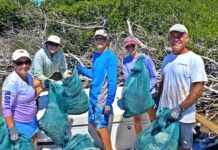Five Things to Know About Monarch Butterflies
1 Monarch butterflies have been rapidly declining in numbers, nearing endangered species status. In the past 15 years, the migratory population has declined 80% on the East Coast and 97% on the West Coast. The estimated decline in population has been attributed to a loss of habitat and natural disasters occurring during migrations.
2 In January of each year, the monarchs leave their winter homes in Mexico and begin their annual migration north to points as far away as New England and Canada. At the end of the summer, they begin the 3,000-mile trip back to Mexico. One single butterfly does not make the trip. It takes at least four generations of monarchs to feed, fly and reproduce their way up and down the East Coast. Finding food and proper habitat for producing the next generation is the key to their survival as a species.
3 The monarchs come through the Keys in January through March (their northbound trip) and again in September through early November (their southbound trip). They are eager to find “monarch waystations” to provide them with nectar (food) plants such as porterweed, lantana, Mexican sunflower and plumbago. Monarchs thrive when they have access to milkweed plants (host) for egg laying.
4 Monarchs are known for their interesting metamorphosis process. Eggs are laid on the underside of a milkweed leaf and the emerging caterpillars feed on the leaves until satiated. The caterpillar then spins a silk pad to attach its hind legs to and transforms into a light green chrysalis, complete with shiny golden dots. In about 12 to 14 days, the beautiful monarch emerges from the chrysalis. Remember: No milkweed, no monarchs.
5 How can you help? Consider planting 20 monarch-friendly plants to make it easier for the monarchs to find their next meal and a safe place to produce the next generation. The Florida Keys are well positioned to create a chain of waystations to assist the butterflies in their annual migration. Your actions will make a difference!
The Marathon Garden Club has a goal of certifying 30 gardens in our city. To learn more about how to plant a monarch garden and become certified as a monarch butterfly sanctuary garden, please contact the club at 305-743-4971 or email ssingleton@bluefinbayllc.com.






















